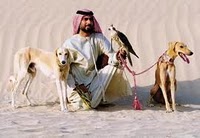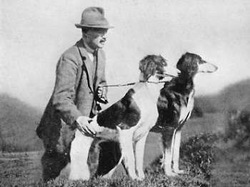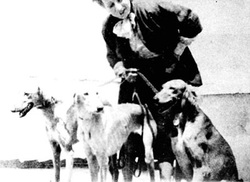Saluki
History

Origin- The Middle East
The saluki is one of the oldest domesticated breeds where paintings, carvings, and references have been found in Middle Eastern Sumerian empire excavations and Assyrian temples dating back 7000 B.C (American Kennel Club; American Kennel Club [print]; Taylor et al.). Parker et al. constructed a phylogenetic tree to show how closely related the Saluki is to the wolf ancestor, where the fourth split resulted in the saluki. Salukis were deemed of great important as companions to the Pharaohs during Egyptian times where images on ancient tombs as well as mummified saluki remains have been found in the Upper Nile region (American Kennel Club; Mitchell; Saluki Club of America). The term ‘Dog’ in the Bible actually refers to the saluki, and even though dogs were considered unclean animals, the Moslem stated salukis as sacred and ‘the noble one’ given to them by Allah and are considered the ‘royal dog of Egypt’(American Kennel Club [print]; Saluki Club of America). The location of origin is difficult to pinpoint since the Middle Eastern desert tribes were nomadic. Their habitat ranged from the Capsian Sea to the Sahara, including Egypt, Arabia, Palestine, Syria, Mesopotamia, Anatholia, and Persia (American Kennel Club [print]). The various geological locations show small variations in saluki size and coat (American Kennel Club [print]).
Salukis are still prized and carefully bred by the Arabs of the Middle East, and are the only dog allowed to sleep in the tents and courtyards (Mitchell; Taylor et al.). They were, and still are, used for companionship, guarding, and especially hunting (Taylor et al.). Salukis were bred for their sight and speed to feed the Arab tribes by taking down gazelle, jackals, foxes, hares, bustard, wild ass and wild boar (American Kennel Club [print]; Taylor et al.). They are so prized that the Bedouin Middle Eastern Tribe will never sell a saluki, rather they occasionally give one as a precious gift (Taylor et al.).
The saluki is one of the oldest domesticated breeds where paintings, carvings, and references have been found in Middle Eastern Sumerian empire excavations and Assyrian temples dating back 7000 B.C (American Kennel Club; American Kennel Club [print]; Taylor et al.). Parker et al. constructed a phylogenetic tree to show how closely related the Saluki is to the wolf ancestor, where the fourth split resulted in the saluki. Salukis were deemed of great important as companions to the Pharaohs during Egyptian times where images on ancient tombs as well as mummified saluki remains have been found in the Upper Nile region (American Kennel Club; Mitchell; Saluki Club of America). The term ‘Dog’ in the Bible actually refers to the saluki, and even though dogs were considered unclean animals, the Moslem stated salukis as sacred and ‘the noble one’ given to them by Allah and are considered the ‘royal dog of Egypt’(American Kennel Club [print]; Saluki Club of America). The location of origin is difficult to pinpoint since the Middle Eastern desert tribes were nomadic. Their habitat ranged from the Capsian Sea to the Sahara, including Egypt, Arabia, Palestine, Syria, Mesopotamia, Anatholia, and Persia (American Kennel Club [print]). The various geological locations show small variations in saluki size and coat (American Kennel Club [print]).
Salukis are still prized and carefully bred by the Arabs of the Middle East, and are the only dog allowed to sleep in the tents and courtyards (Mitchell; Taylor et al.). They were, and still are, used for companionship, guarding, and especially hunting (Taylor et al.). Salukis were bred for their sight and speed to feed the Arab tribes by taking down gazelle, jackals, foxes, hares, bustard, wild ass and wild boar (American Kennel Club [print]; Taylor et al.). They are so prized that the Bedouin Middle Eastern Tribe will never sell a saluki, rather they occasionally give one as a precious gift (Taylor et al.).
Click here to edit.

England
A few Persian salukis made their way to England in 1840 where they were known as the Persian Greyhound; however, they did not spark any interest at first (American Kennel Club; American Kennel Club [print]). It wasn’t until 1895 when Arabian salukis from Egypt were imported by Honarable Florence Amherts (American Kennel Club; American Kennel Club [print]; Saluki Club of America). England became more fascinated with this breed during the Great War in the East where several more salukis were brought back to England as war prizes or gifts from tribes (American Kennel Club [print]). In 1923, the Gazelle Hound Club (Saluki) of England was founded and the saluki was officially recognized as a breed by the Kennel Club of England (Saluki Club of America). Salukis were predominantly used for hunting hare, and then became very popular all over the continent in sports such as racing, lure coursing, and agility (American Kennel Club [print]).
A few Persian salukis made their way to England in 1840 where they were known as the Persian Greyhound; however, they did not spark any interest at first (American Kennel Club; American Kennel Club [print]). It wasn’t until 1895 when Arabian salukis from Egypt were imported by Honarable Florence Amherts (American Kennel Club; American Kennel Club [print]; Saluki Club of America). England became more fascinated with this breed during the Great War in the East where several more salukis were brought back to England as war prizes or gifts from tribes (American Kennel Club [print]). In 1923, the Gazelle Hound Club (Saluki) of England was founded and the saluki was officially recognized as a breed by the Kennel Club of England (Saluki Club of America). Salukis were predominantly used for hunting hare, and then became very popular all over the continent in sports such as racing, lure coursing, and agility (American Kennel Club [print]).
Title.

North America
The first recorded saluki in America was in 1861, but the breed was not recognized by the American Kennel Club until 1927 (American Kennel Club; Saluki Club of America). At this same time the Saluki Club of America was also formed (Saluki Club of America). Earlier dogs brought into the country were not bred and the progeny were registered (Saluki Club of America). In 1932, several Amherstia salukis were imported into Massachusetts to help form the famous Diamond Hill kennels in Rhode Island, housing as many as 50 salukis (Saluki Club of America). Many famous award winning dogs were bred from this blood line (Saluki Club of America). New blood was introduced in 1945 where two Arabian desert salukis, one male and one female, were brought to America (Saluki Club of America). The American Kennel Club made a special ruling, the second time in history, where progeny of the pair could be officially registered in the US (Saluki Club of America). This progeny later became undefeated in several Hound Group show placings, winning numerous awards (Saluki Club of America).
The first recorded saluki in America was in 1861, but the breed was not recognized by the American Kennel Club until 1927 (American Kennel Club; Saluki Club of America). At this same time the Saluki Club of America was also formed (Saluki Club of America). Earlier dogs brought into the country were not bred and the progeny were registered (Saluki Club of America). In 1932, several Amherstia salukis were imported into Massachusetts to help form the famous Diamond Hill kennels in Rhode Island, housing as many as 50 salukis (Saluki Club of America). Many famous award winning dogs were bred from this blood line (Saluki Club of America). New blood was introduced in 1945 where two Arabian desert salukis, one male and one female, were brought to America (Saluki Club of America). The American Kennel Club made a special ruling, the second time in history, where progeny of the pair could be officially registered in the US (Saluki Club of America). This progeny later became undefeated in several Hound Group show placings, winning numerous awards (Saluki Club of America).
